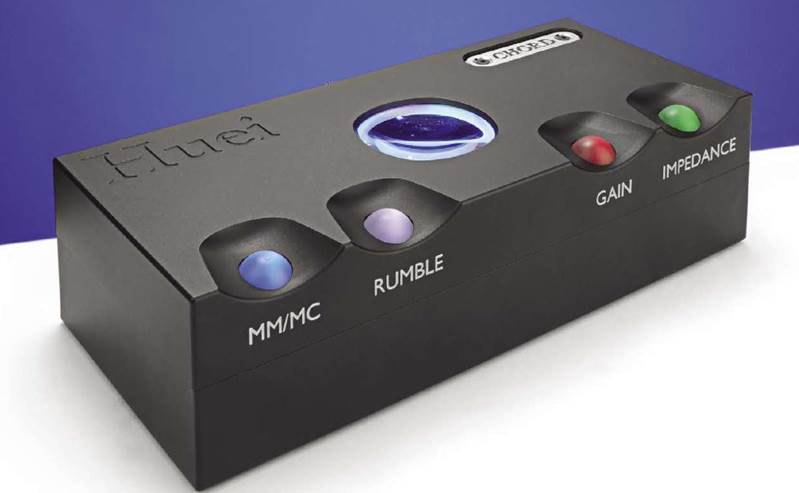Chord Huei review – Huei Display
A small phono stage with big visuals. Noel Keywood listens. Read our Chord Huei review.
This little phono stage from Chord Electronics is small but bristles with coloured lights and catches the eye – not your average blackbox phono stage by any means. Hewn from a solid billet of aluminium it feels as sturdy as a brick, albeit a small one. Chord Electronics products now mostly come similarly hewn and intriguing to look at if a little more expensive than Huei.
What you get in this small package is a stage that is aimed more at high quality moving coil cartridges than ‘lesser’ moving magnets (MM).
I say this because pressing the left hand MM/MC select button – or illuminated sphere should I say – for MM causes the right hand Impedance sphere to fall dark. There are no loading options, such as capacitance, for MM. Select MC however and the Impedance light comes on, offering no fewer than twelve impedance options for MC, some I have never seen before. So gentlemen, start your MCs!
Each setting invokes a different button colour and I needed 100 Ohms for our Ortofon Cadenza Bronze moving coil cartridge that, it turned out, was difficult to be sure about because some of the colour differences are quite subtle. But they select in strict sequence and Chord Electronics provide a chart to help sort this out. What I wanted was 100 Ohms without 2.2 muyF, the latter option being shaded yellow.
But why have a 2.2 muyF option?
This is something I have never seen before, but understand the thinking.
It rolls down treble from a low impedance MC cartridge, its effect depending upon generator impedance (commonly 10 Ohms resistive). A 2.2 muyF capacitor is equally 10 Ohms at 7kHz so it will roll off treble (don’t want to get too technical here!). There are six MC load options from 3700 Ohms down to 100 Ohms, each with 2.2 muyF accompanying capacitance as an option.
So much for loading. Gain can be changed and again MM seemed an
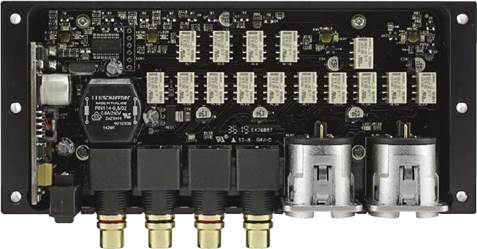
Huei uses a microprocessor (digital!) to select all the many options on offer. Doing so in sensitive low voltage circuits means using high quality sealed miniature relays, seen here as small white rectangles, that click as selections are made. Huei uses miniature surface mount components on a densely populated board; the sockets look vast by comparison.
“the orchestra loomed large and there was a good sense of grip on pace”
after-thought. High quality MMs can have low-ish output and need at least xl00 gain but via its phono sockets Huei has x88 – low. As a result, with our Creek Evolution 100A amplifier I had to turn volume up. Double this gain is available from Huei’s XLR outputs and I could have used them, but for the fact that Huei has no volume control and nor does the Creek with XLR. The seven gain options were all lower than x88 and of no practical use I am aware of.
With MC the seven gain values available usefully straddle what such cartridges produce.
The gain value commonly used for MC is x 1000 (60dB) and Huei offers x300 – x 1600 from its phono socket outputs. Meaning it will match all MCs well, including low output (high quality) types from its phono socket outputs, with even more gain available from the XLR socket output.
That covers three of the four illuminated spheres and their functions, the last remaining being Rumble. It’s an unusual and odd description, because modern turntables don’t rumble. More strange is that this option is quite unlike any other low filter, meaning warp filter. Yet by cutting bass in vertical modulation only, when the needle is going up and down rather than left and right, it eliminates warps too, because they go up and down. The clever bit here is that the filter does not affect audible bass, where
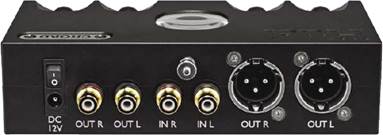
Huei’s rear panel carries RCA phono socket inputs only (no balanced XLR). However, output is conveyed by phono sockets and XLR, the latter giving double gain and output. A tiny mains power rocker switch lies here too, just above the 12V d.c. input.
the needle wiggles left-to-right. So in theory at least, Huei’s Rumble filter eliminates unwanted low bass signals, whilst retaining wanted low bass signals – an intriguing idea I had to check in listening tests of course.
Lack of variable output means Huei cannot drive a power amplifier direct and at £ and with Chord Electronics skills in such matters, it should have been given this now- common option I feel.
The compact case measures 160mm wide, 72mm deep and 41mm high, weight 657gm. It will slip into a system easily enough sideways on a rack, but for all the lights to be visible needs 160mm lateral clearance.
Power comes from a 12V wall- wart. Since this is low voltage d.c. there is no earth connection, avoiding hum from a hum loop.
SOUND QUALITY
I connected Huei to our Timestep Evo modified Technics SL-I2I0 Mk2 Direct Drive turntable with SME309 arm and Audio Technica’s VM750SH MM cartridge, plus Ortofon’s Cadenza Bronze MC cartridge. It fed a Creek Evolution I00A amplifier driving Martin Logan hybrid electrostatic loudspeakers.
With Ortofon’s Cadenza Bronze moving coil cartridge Huei set up a big wide sound stage in front of me. There was no hiss or hum, just perfect silence until needle hit the groove. Spinning Fanfare for the Common Man, from Two Countries One Heart – an all-analogue and well balanced 180gm LP – kettle drum strikes were fast and clean, having plenty of visceral power. Brass blared with fruity impact and the whole performance strode along with good pace. Intrigued by the novel Rumble filter I pressed it on and off and bass power was unaffected, kettle drum losing no impact. There were small clicks when making selections with music playing however.
With Big Band Spectacular from the Syd Lawrence Orchestra, a recent live recording from Chasing the Dragon (direct-cut and tape transcription), strenuous drumming in Sing, Sing, Sing had plenty of weight and again came over as clear and fast. There wasn’t the depth our Icon Audio PS3 Mk2 valve phono stage imparts, but Huei has a big sound nevertheless. With In The Mood, the orchestra loomed large and there was again a good sense of grip on pace, generous low end power allowing plucked acoustic bass to be
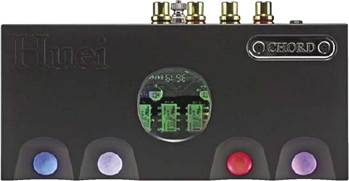
With products from Chord Electronics you get to see inside, courtesy of a small circular viewing window and internal lighting. Huei has this and four rotating illuminated spheres for manual control of gain, loading and filter options.
obvious in the performance.
Spinning Mobile Fidelity’s remaster of Dire Straits Love Over Gold (I80gm, 45rpm) delivered a strong, tuneful bass line from Walk of Life, Mark Knopfler’s vocals standing firm and clear centre stage. This performance showed that Huei is revealing as well as large-scaled; I caught every word from Knopfler.
The only time I obviously heard the Rumble filter was when dropping needle into groove whilst hand cueing: the thump had less thump.
I fancy that at other times it made bass sound a bit drier, but it was hard to detect. In theory at least, heavy bass recorded full left or right will be attenuated, but LPs are cut with bass as a mono signal to prevent large vertical excursions, which LP cannot handle, so the Rumble filter ends up doing its job but being inaudible – clever stuff!
CONCLUSION
Huei is a neat little phono stage with some interesting features. It is purposed for moving coil (MC) cartridges where it provides more gain and loading options than most, moving magnet (MM) types being a side issue. With superb build and finish, plus a large sound stage and excellent clarity, it is definitely worth hearing.
MEASURED PERFORMANCE
Frequency response of the Huei measured flat from a low 4Hz up to 20kHz our response analysis shows. The Rumble filter combines the channels below 200Hz to suppress vertical warp and rumble info by cancelling vertical (out-of-phase) components – a different and novel approach to this problem. Cancellation is introduced by progressively combining the two channels to produce mono bass in effect. Measured with vertical modulation from JVC TRS-1007 test disc the filter introduced massive attenuation below 150Hz, measuring -17dB at 50Hz, but this does not affect mono bass so it will not obviously lighten bass.
Huei has seven gain settings each for MM and MC. Measured values for MM were x68-x13 (37dB-22dB) from input to phono-socket output. These are low values for MM: volume will have to be turned up in an accompanying amplifier. Around x100 is usual. Gain doubles via XLR balanced output, giving x136 (43dB) maximum, so XLR out is best used. Huei overloads at a high 140mV in at full MM gain.
Measured gain values for MC were x302 – x1600 via phono outputs and double via XLR output. This is a good gain range for MC, x1000 (60dB) being a common value, so Huei’s gain range straddles the common value used for MC and it has enough gain for low output types.
Noise was low at 0.18 muyV equivalent input noise A weighted. This works out at -67dBV with gain setting at x1000 (dark blue) for equivalence to other MC phono stages.
The Huei measured well in all respects. It has a very broad range for matching to MC cartridges.
Frequency response 4Hz-20kHz
Distortion (MC) 0.15%
Separation (1kHz) 68dB
Noise (MM/MC) -81dBV / -67dBV
Max gain
MM, MC, phono out x68; x1600 MM, MC, XLR out x136; x3200
O’load (phono/XLR) 9.5V/19V out
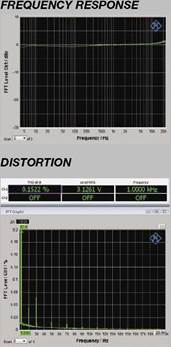
EXCELLENT – extremely capable.
VERDICT
Chord Electronics
+44 (0)1622 721444
www.chordelectronics.com
